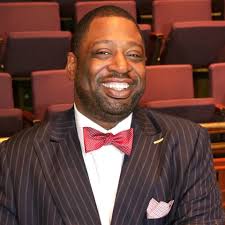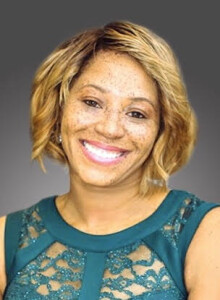Arrington Faces Ethics, Bar Complaint for Conflict of Interest (UPDATE 1)
 (APN) ATLANTA — Fulton County Commission Vice Chair Marvin Arrington, Jr., (District 5) is facing an ethics complaint and a bar complaint for his conflict of interest in running Fulton County Government while obtaining favorable results for his clients as a criminal defense attorney in Fulton County’s court system.
(APN) ATLANTA — Fulton County Commission Vice Chair Marvin Arrington, Jr., (District 5) is facing an ethics complaint and a bar complaint for his conflict of interest in running Fulton County Government while obtaining favorable results for his clients as a criminal defense attorney in Fulton County’s court system.
State Rep.-elect Mesha Mainor (D-Atlanta) filed the complaints against Commissioner Arrington, Jr., after his conflict became apparent in his representation of Corwin Monson.
Commissioner Arrington is representing Mr. Monson in a criminal defense matter where Rep.-elect Mainor has been seeking enforcement of a restraining order against Monson for aggravated stalking.
 Mainor filed the Bar Complaint with the State Bar of Georgia on Oct. 21, 2020. She filed the ethics complaint with Fulton County Board of Ethics by mailing a notarized copy on Oct. 24, she said.
Mainor filed the Bar Complaint with the State Bar of Georgia on Oct. 21, 2020. She filed the ethics complaint with Fulton County Board of Ethics by mailing a notarized copy on Oct. 24, she said.
“Fulton County Commissioner Marvin Arrington is using his elected position to sway deals as a criminal defense attorney,” Mainor wrote in the Bar Complaint, a copy of which has been obtained by Atlanta Progressive News.
“More than one ADA stated that when Fulton County Commissioner Marvin Arrington can’t get his way, he tells them, ‘I’ll just talk to Paul [Howard],’ Fulton County District Attorney,” Mainor wrote.
“It is unethical for Marvin Arrington to practice criminal law against Fulton County, whom he he [sic] has sworn to protect in his oath of office. Marvin Arrington is double dipping,” Mainor wrote.
“He is being paid by Fulton County to work against Fulton County, and also is responsible for paying Fulton County judges and the DA office which he presents cases to,” Mainor wrote.
Commissioner Arrington, Jr., was elected to the Fulton County Board of Commissioners in 2014; and he has still practiced both civil and criminal law in cases before Fulton County Superior Court in that time.
In 2017, Arrington, Jr., began representing a client, Carl Drury, III, in a tort matter in Fulton County Superior Court – causing multiple judges to recuse themselves from hearing the case.
After Arrington, Jr., filed a notice of appearance as Drury’s attorney, Fulton County Superior Court Judge Robert McBurney recused himself from the case because of the conflict of interest stemming from Arrington’s role as Fulton County Commissioner.
“As Defendant Drury knows or should have known, Attorney Arrington honorably serves this County as a duly-elected County Commissioner,” Judge McBurney wrote in the October 23, 2017 order.
“The County Commission plays a significant role in the operations of the Superior Court, to include setting the Court’s budget, determining court employee salaries, and establishing the Judges’ county supplement (an augmentation of our state salary),” McBurney wrote.
“Consistent with Rule 1.2(A) (promoting public confidence in the independence and impartiality of the judiciary) and Rule 2.11(A) (requiring disqualification when the public might reasonably question a judge’s impartiality) of the Georgia Code of Judicial Conduct, the undersigned is sua sponte recusing from this matter,” McBurney wrote. Sua sponte means of his own initiative, or without a motion.
Two days later, Fulton County Superior Court Judge Craig Schwall recused himself from the Drury case for the same reason.
On Nov. 23, 2017, Judge Paige Reese Whitaker filed a notice of basis for disqualification for the same reason.
However, despite three judges putting Commissioner Arrington, Jr., on notice of at least the appearance of impropriety, he continues to represent clients in criminal and civil matters in Fulton County.
ARRINGTON’S ROLE IN THE CORWIN MONSON STALKING CASE
 “I’ve been stalked for almost two years. It started in January 2019, with a campaign volunteer,” Mainor wrote in the Bar Complaint.
“I’ve been stalked for almost two years. It started in January 2019, with a campaign volunteer,” Mainor wrote in the Bar Complaint.
Mainor previously ran in the March 19, 2019 Special Election for Atlanta City Council District 3 before being elected to House District 56 in 2020.
Within two weeks, “he was yelling, being aggressive, irrational, overbearing,” Mainor told Atlanta Progressive News.
In February 2019, Mainor let him go from the campaign. After that, “he was in full stalker mode, calling me hundreds of times a day, leaving voicemail messages.
It became frightening.”
“By May, he was dropping gifts off at my house because he couldn’t talk to me,” Mainor said.
“By June, I had criminal trespassing orders because he was blocking my driveway. Because he was at my door. I called 911, he’s on my property, he won’t leave. They said, do you want criminal trespassing orders? I said yes.”
“By July, he joined my church,” Mainor said.
In August 2019, Mainor obtained a thirty day restraining order from Fulton County Magistrate Court Judge Alexandra Manning; and in September 2019, obtained a one year order.
After Monson violated the restraining order on multiple occasions, Mainor called the police and Monson went to jail.
In October 2019, Judge Manning let Monson out on bond. However, he continued to violate the restraining order.
According to Mainor, Commissioner Arrington went over the head of the Assistant District Attorney assigned to Mainor’s case, to Fulton County District Attorney Paul Howard, in order to obtain a better deal for his client, Mr. Monson.
As Fulton County Commissioner, Arrington’s job is supposed to be about promoting the health, safety, and welfare of the people of Fulton County.
And yet, by representing Mr. Monson, Arrington is leveraging his position as Commissioner to undermine the public safety of the people of Fulton County, according to Mainor.
“District Attorney Paul Howard is giving Arrington (friendship) deals without even looking at the facts of the case. Monson has been arrested twice for stalking me. Paul Howard offered Arrington a misdemeanor for felony aggravted [sic] stalking without even seeing the evidecvce that was in the posession of ADA Jeremy Daily,” Mainor wrote.
“Arrington is using his elected role as Fulton County Commissioner to elicit deals from the Fulton employees he pays and manages,” Mainor wrote.
“Several ADA report being intimidated by Arringtom because of his position as County Commissioner versus colleage criminal defense attorney. ADA staff have state they feel uncomfortable with the position Fulton County Commissioner Marvin Arrington places them in, which jeopardizes their ability to protect Fulton County residents,” Mainor wrote.
Monson went to back to jail today, November 05, 2020, according to Rep.-elect Mainor, after Fulton County Superior Court Judge Kelly Lee Ellerbe held a hearing regarding Monson’s violations of the restraining order.
Previously, Commissioner Arrington had his own criminal issues in Fulton County Superior Court, when he was arrested for allegedly pushing and dragging his wife in a domestic dispute.
Commissioner Arrington did not immediately respond to a message left at his law office seeking comment.
(END / Copyright Atlanta Progressive News / 2020)
UPDATE 1 and CORRECTION: A previous version of this article stated that Mr. Monson had been charged with aggravated assault; however, the charge is for aggravated stalking. The article has been updated and corrected to reflect the correct information.
Matthew,
I read your article and was completely shocked to learn that Rep-Elect Mainor has filed an ethics and bar complaint against me. Both claims are completely frivolous.
I will also send you a 2nd email as I have completely and thoroughly researched this issue. Unfortunately, the Georgia Supreme Court disagrees with Ms. Mainor, Judge McBurney, Judge Schwall and Judge Whitaker.
My official statement is here below. I will also send you a copy of my brief in support of my position. I ask that you post both in their entirety on your website and that you do a story stating that these claims are frivolous.sss
I categorically deny any and all claims asserted by Rep. Elect Meesha Manior. I have not committed any ethics violations nor have I committed any bar violations. I have been practicing law for 25 years since 1996 when I graduated from the Emory University School of Law. I practiced law for 19 years before being elected by residents of Fulton County as their representative for District 5. My father is a former Superior Court Judge in Fulton County and we have 7 lawyers in my family.
I have a right to earn a living as a lawyer. I will vehemently and ferociously protect my right to earn a living. This is how I feed and care for my family. We should be careful as it would be unconstitutional to not allow lawyers, plumbers, doctors or others to serve as legislators in our community. Do we not want lawyers helping to draft our laws. Don’t lawyers stand in a better position to help draft legislation based on their practice of law. Do we want as a society to deter lawyers from running to be legislators.
First, the state pays the salary of the District Attorney and the Judges. As such, the state and state legislators are more involved than county commissioners. The county provides salary supplements to the District Attorney and the Judges but the state sets their salaries and pays their salaries. As a state legislator, Rep Elect Mainor should know this. Her claims are frivolous and I will be seeking attorney’s fees for having to respond to such frivolous claims.
The county acts through its commission. In Fulton County, the commission is comprised of seven (7) members. To act, the county commission requires an affirmative vote of four (4) commissioners. Elected Officials are presumed to act in Good Faith; that includes commissioners, district attorneys and judges. Kelly v. State. 238 Ga. App. 691.
Second, she must also be unaware that my father, former Superior Court judge and Mr. Paul Howard were continually at odds. There is no close personal relationship between me and Mr. Howard. As an attorney, I always have the right to approach the elected District Attorney in any county about any case where I represent a criminal defendant. Further, in Fulton County the district attorneys in the courtroom are not given the authority to negotiate they are required to speak with Mr. Howard for approval of any and/or all negotiated pleas, bonds, etc.
I have a thirty page brief that addresses all of the issues. Judge McBurney was wrong and all the judges that recused from my cases are wrong but judges have the authority to recuse themselves for any reason. It is interesting to note that none of those judges recuse themselves from cases where state legislators who are also lawyers represent the clients (i.e. Wendell Williard, David Ralston, Josh McKoon, David Dreyer, William Boddie.) So why would they recuse for my cases? Doesn’t state have more participation in the judicial system than county or just as much? Certainly, the state legislators have more influence over the judges, district attorneys by setting their salaries and they actually draft the laws that the judges are tasked with interpreting. So what do we do bring in judges from out of state to hear cases where state legislators represent clients? I think not.
Some highlights from my brief are below:
1. In Blumenfeld v. Borenstein, the Georgia Supreme Court held “[i]t does not follow that professional people will allow their status and intimacy to interfere with their professional obligations.” 247 Ga. 406 (1981). They went on to state that “a per se rule of disqualification on the sole ground of status would not only be unfair to the attorney so disqualified, but also to their clients [and] would have a significant detrimental effect upon the legal profession.” Id. The court reasoned that “such a rule could be expected to affect the hiring practices of law firms and the professional opportunities of lawyers.” Id.
2. The Supreme Court of Georgia addressed a similar issue in advisory Opinion No. 05-12, S06U1489, the court stated that an Atlanta city council member could represent criminal Defendant(s) in Atlanta all Municipal Court matters and where police exercise discretion and council controls police budget. The Court ruled, “the mere fact of representation of a criminal Defendant, by an Attorney who is member of city council, where council controls budget of police department and where the police exercise discretion is not grounds for recusal.” If Atlanta City council member, who is an Attorney can appear before an Atlanta Municipal Court Judge, to represent a client, it follows that Judge of same jurisdiction cannot be automatically disqualified because a Commissioner controls the budget. It also follows that a county commissioner can practice law in the courts of the county where he lives and is a commissioner.
3. The Supreme Court of Georgia ruled that a judge is not per se disqualified to try a case when one of the parties is a church, lodge, or society of which the judge is a member. Blakeman v. Harwell, 198 Ga. 165 (1944). Here, the government of Fulton County is akin to a society, it is a government association. Just as if the party and the judge were in a fraternity or lodge or bar association. Just because lawyers and judges are both members of the State Bar of Georgia doesn’t mean a judge has to automatically recuse himself, as the lawyers are also members of the Bar. A government entity is an association and just because one of the government employee’s (commissioner or otherwise) is a party to a case or represents a party to a case is not automatic grounds for recusal. See Blakeman v. Harwell. Since a government is an association, a judge from same county as lawyer/commissioner is not automatically disqualified because a party is in association with Judge. Similarly, a judge is not automatically disqualified because an attorney is in association, like the State Bar of Georgia or a fraternity, with a judge.
4. It is well settled law that a client has the right to an attorney of its choice. The Supreme Court of Georgia ruled that “the right to counsel is an important interest which requires that any curtailment of the client’s right to counsel of choice be approached with great caution.” See Blumenfeld v. Borenstein. The Court went on to state “[t]he mere fact that the public may perceive some conduct as improper is, without some actual impropriety, insufficient justification for interference with a client’s right to counsel of choice.” Id. The court further ruled “this becomes even more apparent when the perceived impropriety is not conduct at all, but is, instead, status.” Id.
5. Judges in counties are required to hear cases involving the very counties for which they work. They are required to hear cases involving the District Attorney and Public Defender’s Office of the same counties, cases involving state legislators, city council members in cities within their districts, and parties represented by legislators, state or municipality.
6. “Not only is this not practical, it is not reasonable as professional people will not allow status/intimacy to not meet their professional obligations.” Blumenfeld v. Borenstein, 247 Ga. 406 (1981).
I am disappointed that Rep Elect Meesha Mainor would attack me for doing my job. I don’t have any problems with her. I am fortunate to have a job outside of my elected job and my job requires me to zealously represent my clients. It is offensive to suggest that I would not use my 25 year experience as a lawyer to help my clients and to suggest that I would do something unethical and that the District Attorney would do something unethical for the son of a long time opponent.
It is my hope that she will withdraw these frivolous claims so that I do not have to respond to them nor seek attorney fees for having to respond to these frivolous claims.